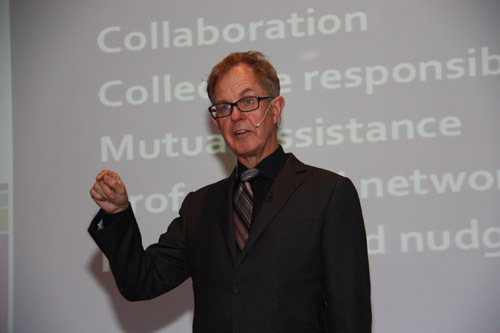
“Schools are driven to place too much emphasis on test scores that capture what can easily be measured. Με αυτόν τον τρόπο, they neglect other important skills and qualities that are difficult to quantify.” — Andy Hargreaves
Μια νέα έκθεση, Data-Driven Improvement and Accountability, authored by Boston College professors Andy Hargreaves and Henry Braun, offers recommendations for establishing more effective systems and processes for evaluating performance of schools. The report explains how the current system of student data collection more often than not creates “perverse incentives” for educators to narrow curriculum, teach to the test and allocate their efforts disproportionately to students who yield the quickest test-score gains, rather than those with the greatest needs. The authors claim the flawed use of data-driven improvement and accountability (“DDIA”) in much of U.S. Education has significant ramifications, since the system has become “driven” έναντι “guided” by test scores. In these circumstances, educational accountability that is intended to contribute to student improvement can actually impede improvement for students.
“When accountability is prioritized over improvement, DDIA neither helps educators make better pedagogical judgments nor enhances educators’ knowledge of, and relationships with their students,” comments Braun. “Schools are driven to place too much emphasis on test scores that capture what can easily be measured. Με αυτόν τον τρόπο, they neglect other important skills and qualities that are difficult to quantify,” adds Hargreaves.
The drive to enhance school performance and learning outcomes for all students has been an educational priority for the last three decades, often creating conflicts between policymakers and educators. There has been major debate over the emphasis on test scores. Hargreaves and Braun argue that our thinking is too narrow. They raise the question: Are we using this data as effectively as we could or has it become a substitute for professional judgment? They contend that data should guide educators in terms of providing feedback, allowing schools to see the problem areas, and intervene and make the necessary student and/or teaching improvements as needed. Επιπλέον, does this data alone properly reflect what students know? Does it measure all that we value?
Και έτσι, what would be the alternatives to the policy tools we currently rely on for school performance? Hargreaves and Braun point out that professional judgments and interventions would need to be based on a wide range of evidence and indicators that properly reflect what students should be learning. They draw comparisons with uses of data in business and professional sports, π.χ.. the Oakland Athletics, the first baseball team to rely on players’ performance statistics for recruitment. “The point being,” adds Hargreaves, “effective teams use data but the data are valued by everyone, and analyzed together with shared responsibility for improvement.” Επιπλέον, high performing educational systems around the world use systemic reforms to promote collective responsibility for improvement. Top down accountability is a last resort in these countries.
Accompanying the report is model legislation authored by attorney Kathy Gebhardt, executive director of Children’s Voices. Based on the Hargreaves and Braun brief, the legislation details how data could be used effectively to create a multi-level system of accountability designed for school improvement.
Hargreaves’ and Braun’s brief concludes with twelve recommendations for establishing more effective systems and processes of Data-Driven or Evidence-Informed Improvements and Accountability.
To review the Hargreaves/Braun report: http://nepc.colorado.edu/publication/data-driven-improvement-accountability
Andrew Hargreaves is the Thomas More Brennan Professor of Education in the Lynch School of Education. Henry Braun is the Boisi Professor or Education and Public Policy in the Lynch School of Education.

Andy Hargreaves, C. M. Rubin, Henry Braun
Photos courtesy of Andrew Hargreaves and Henry Braun.
Στο παγκόσμιο Αναζήτηση για Εκπαίδευση, μαζί μου και παγκοσμίως γνωστή ηγέτες σκέψης συμπεριλαμβανομένου του Sir Michael Κομμωτήριο (Ηνωμένο Βασίλειο), Ο Δρ. Michael Block (ΗΠΑ), Ο Δρ. Leon Botstein (ΗΠΑ), Καθηγητής Clay Christensen (ΗΠΑ), Ο Δρ. Linda Ντάρλινγκ-Hammond (ΗΠΑ), Ο Δρ. Madhav Chavan (Ινδία), Ο καθηγητής Michael Fullan (Καναδάς), Ο καθηγητής Howard Gardner (ΗΠΑ), Ο καθηγητής Andy Hargreaves (ΗΠΑ), Ο καθηγητής Yvonne Hellman (Η Ολλανδία), Ο καθηγητής Kristin Helstad (Νορβηγία), Jean Hendrickson (ΗΠΑ), Καθηγητής Rose Hipkins (Νέα Ζηλανδία), Καθηγητής Cornelia Hoogland (Καναδάς), Αξιότιμο Jeff Johnson (Καναδάς), Η κ. Chantal Kaufmann (Βέλγιο), Ο Δρ. Eija Kauppinen (Φινλανδία), Υφυπουργός Tapio Kosunen (Φινλανδία), Ο καθηγητής Dominique Λαφοντέν (Βέλγιο), Ο καθηγητής Hugh Lauder (Ηνωμένο Βασίλειο), Καθηγητής Ben Levin (Καναδάς), Lord Ken Macdonald (Ηνωμένο Βασίλειο), Καθηγητής Barry McGaw (Αυστραλία), Shiv Nadar (Ινδία), Καθηγητής R. Natarajan (Ινδία), Ο Δρ. PAK NG (Σιγκαπούρη), Ο Δρ. Denise Πάπα (ΗΠΑ), Sridhar Rajagopalan (Ινδία), Ο Δρ. Diane Ravitch (ΗΠΑ), Richard Wilson Riley (ΗΠΑ), Sir Ken Robinson (Ηνωμένο Βασίλειο), Καθηγητής Pasi Sahlberg (Φινλανδία), Καθηγητής Manabu Sato (Ιαπωνία), Andreas Schleicher (PISA, ΟΟΣΑ), Ο Δρ. Anthony Seldon (Ηνωμένο Βασίλειο), Ο Δρ. David Shaffer (ΗΠΑ), Ο Δρ. Kirsten Μοναδική Are (Νορβηγία), Στήβεν Spahn (ΗΠΑ), Yves Theze (Lycee Francais Η.Π.Α.), Ο καθηγητής Charles Ungerleider (Καναδάς), Ο καθηγητής Tony Wagner (ΗΠΑ), Sir David Watson (Ηνωμένο Βασίλειο), Καθηγητής Dylan Γουίλιαμ (Ηνωμένο Βασίλειο), Ο Δρ. Mark Wormald (Ηνωμένο Βασίλειο), Ο καθηγητής Theo Wubbels (Η Ολλανδία), Ο καθηγητής Michael Young (Ηνωμένο Βασίλειο), και ο καθηγητής Minxuan Zhang (Κίνα) καθώς εξερευνούν τα μεγάλα ζητήματα της εκπαίδευσης εικόνα που όλα τα έθνη αντιμετωπίζουν σήμερα. Η Παγκόσμια αναζήτηση για την Εκπαίδευση της Κοινότητας Σελίδα
C. M. Rubin είναι ο συγγραφέας των δύο πολυδιαβασμένα online σειρά για την οποία έλαβε ένα 2011 Βραβείο Upton Sinclair, “Η Σφαιρική Αναζήτηση για Εκπαίδευση” και “Πώς θα μας Διαβάστε?” Είναι επίσης ο συγγραφέας του μπεστ σέλερ τρία βιβλία, Συμπεριλαμβανομένων Η Ρεάλ Αλίκη στη Χώρα των Θαυμάτων.
Ακολουθήστε C. M. Rubin στο Twitter: www.twitter.com/@cmrubinworld






Πρόσφατα σχόλια